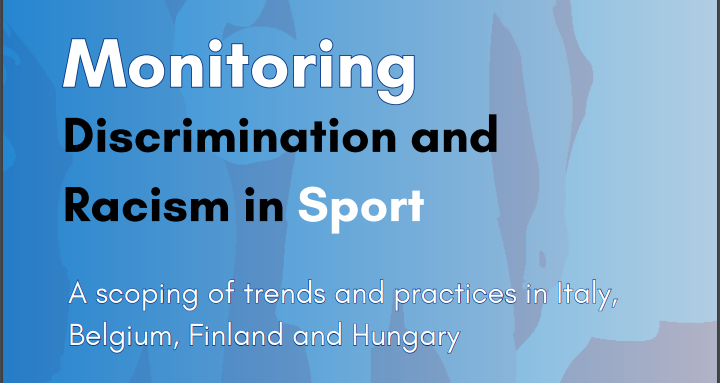
On 7 November, the seminar Monitoring racism and discrimination in sport was held online as part of the European project Monitora, Monitoring racism in sport, funded by the European Commission through the Erasmus+ programme and coordinated by Lunaria.
The Project
The main goal of the project is to strengthen the professional capacities and competencies of CSOs, grassroots sport associations, and national and local institutions needed to monitor, document and report discrimination and racism in grassroots sport in four EU countries, through transnational cooperation activities of research, training and networking.
The seminar was an opportunity to present and discuss the results of the first phase of the project, which focused on the research on monitoring forms of discrimination and racism in sport currently existing in four European countries (Italy, Hungary, Belgium and Finland) and resulted in four national reports and one transnational report.
Seminar structure
The seminar was attended by sports practitioners, club representatives, journalists, academics, activists, social workers and institutional representatives from the various countries involved in the project. The meeting was articulated into a first part in plenary, in which the project was introduced and the transnational report was presented, and a second part, divided into subgroups, to discuss the good practices experienced by the participants, at local or European level, in monitoring and denouncing discrimination and racist violence in grassroots sport.
From the research carried out in the various countries, what first emerged is that real systems for monitoring racism in sport do not exist and, when they do exist, they focus on elite sports, often leaving out grassroots sport.
During the meeting, it has been proposed a first distinction, which proved to be very timely for the purposes of analysis and discussion, between proactive and reactive monitoring. The former seek to anticipate and prevent possible negative consequences, for example through preventive actions such as awareness-raising campaigns; the latter are, on the other hand, monitoring actions in the usual sense, operating with respect to facts or events that have already occurred. There was also an important focus on the role that ideology plays behind discrimination. Ideology plays a fundamental role not only politically, but also culturally: by ignoring the pervasiveness and systemicity of racism, one overlooks how even the very organizations that practice anti-discrimination/anti-racism can reproduce racist acts and behavior.
Finally, it has repeatedly emerged how monitoring is an activity with a fundamental importance as it is closely linked to the protection of persons targeted by discriminatory or racist acts.
A proposal for a protocol
Starting with the questions “What can we do to improve the activity of monitoring racism in sport?” and “What content should be included in a protocol for monitoring racism in sport?” four sub-groups, two in English, one in French and one in Italian, started their discussion.
The discussions in the subgroups represented a valuable opportunity to exchange experiences and also provided input both for the definition of the meaning of monitoring – for example the role it has as a tool to support an awareness-raising process on racist discrimination – and for the creation of a proposal for a protocol to monitor racism in sport that could be adopted in the different European states, which is now being finalised. The monitoring of racism, whether proactive or reactive, is a potentially important tool both for those who experience discrimination at first hand and for those who deal with racist and discriminatory phenomena every day. The publication of guidelines establishing a common lexicon and practices is a first step to countering a pervasive phenomenon that creeps into the daily lives of everyone, even in a world where there should be carefree play, such as in grassroots sport where many young people meet.








